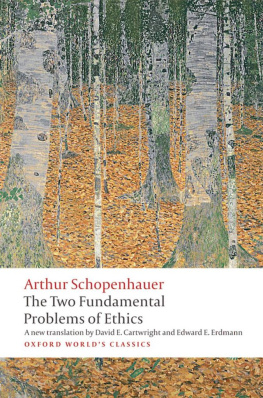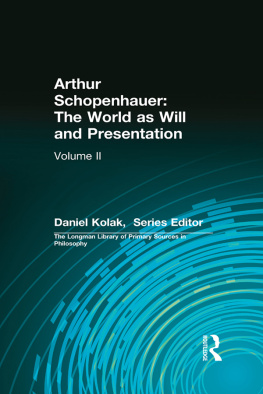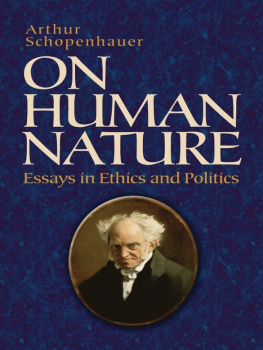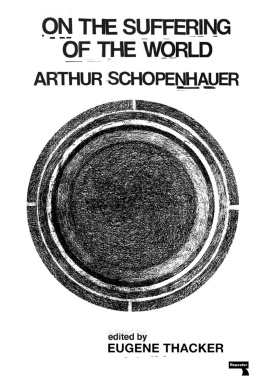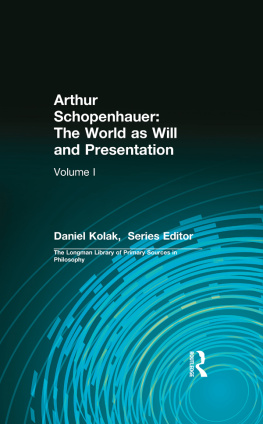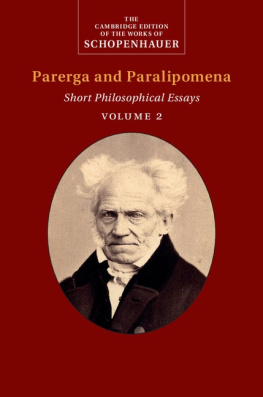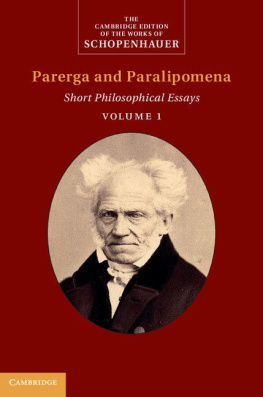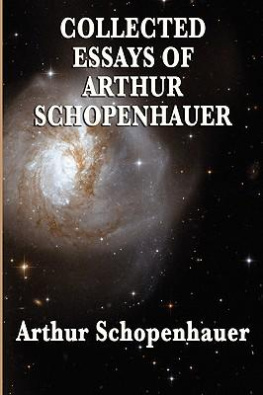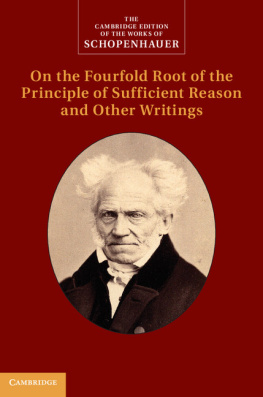Schopenhauer Arthur - Two Fundamental Problems of ethics
Here you can read online Schopenhauer Arthur - Two Fundamental Problems of ethics full text of the book (entire story) in english for free. Download pdf and epub, get meaning, cover and reviews about this ebook. year: 2010, publisher: Oxford University Press, genre: Science. Description of the work, (preface) as well as reviews are available. Best literature library LitArk.com created for fans of good reading and offers a wide selection of genres:
Romance novel
Science fiction
Adventure
Detective
Science
History
Home and family
Prose
Art
Politics
Computer
Non-fiction
Religion
Business
Children
Humor
Choose a favorite category and find really read worthwhile books. Enjoy immersion in the world of imagination, feel the emotions of the characters or learn something new for yourself, make an fascinating discovery.
- Book:Two Fundamental Problems of ethics
- Author:
- Publisher:Oxford University Press
- Genre:
- Year:2010
- Rating:3 / 5
- Favourites:Add to favourites
- Your mark:
- 60
- 1
- 2
- 3
- 4
- 5
Two Fundamental Problems of ethics: summary, description and annotation
We offer to read an annotation, description, summary or preface (depends on what the author of the book "Two Fundamental Problems of ethics" wrote himself). If you haven't found the necessary information about the book — write in the comments, we will try to find it.
Schopenhauer Arthur: author's other books
Who wrote Two Fundamental Problems of ethics? Find out the surname, the name of the author of the book and a list of all author's works by series.
Two Fundamental Problems of ethics — read online for free the complete book (whole text) full work
Below is the text of the book, divided by pages. System saving the place of the last page read, allows you to conveniently read the book "Two Fundamental Problems of ethics" online for free, without having to search again every time where you left off. Put a bookmark, and you can go to the page where you finished reading at any time.
Font size:
Interval:
Bookmark:
OXFORD WORLDS CLASSICS
ARTHUR SCHOPENHAUER was born on 22 February 1788 in the Hanseatic free city of Danzig (now Gdansk, Poland). His father was a successful merchant and one of Danzigs leading citizens. The family moved to Hamburg to escape the citys annexation by Prussia in 1793. Schopenhauer spent two years in France from 1797 to 1799, and after four years in private school and a sixteen-month tour of Europe was preparing to begin an apprenticeship with a Hamburg merchant when, in April 1805, his father suddenly died. After two years Schopenhauer abandoned his apprenticeship and enrolled at the University of Gttingen where he studied Plato and Kant. He began reading Eastern philosophy and became the first Western philosopher to integrate Eastern thinking in his work. His masterpiece, The World as Will and Representation, appeared in December 1818. He joined the University of Berlin as lecturer in the philosophy faculty, where he clashed with Hegel, a fellow member of the faculty. He published On the Will in Nature in 1836, and The Two Fundamental Problems of Ethics in 1840, with a vitriolic preface criticizing the Royal Danish Society who had denied a prize to his second essay. In 1844 Schopenhauer published a second edition of The World as Will and Representation, adding a second volume of fifty essays. A two-volume collection of essays entitled Parerga and Paralipomena appeared in 1851. Schopenhauer died in Frankfurt in September 1860, after a short illness.
DAVID E. CARTWRIGHT is Professor of Philosophy at the University of WisconsinWhitewater. He has written widely on Schopenhauer and is the author of the Historical Dictionary of Schopenhauers Philosophy (2005) and Schopenhauer: A Biography (2010).
EDWARD E. ERDMANN is Assistant Professor in Languages and Literatures, University of WisconsinWhitewater.
CHRISTOPHER JANAWAY is Professor of Philosophy at the University of Southampton. He is the author of Self and World in Schopenhauers Philosophy (1989), Schopenhauer: A Very Short Introduction (2002), and editor of The Cambridge Companion to Schopenhauer (1999).
OXFORD WORLDS CLASSICS
For over 100 years Oxford Worlds Classics have brought readers closer to the worlds great literature. Now with over 700 titlesfrom the 4,000-year-old myths of Mesopotamia to the twentieth centurys greatest novelsthe series makes available lesser-known as well as celebrated writing.
The pocket-sized hardbacks of the early years contained introductions by Virginia Woolf, T. S. Eliot, Graham Greene, and other literary figures which enriched the experience of reading. Today the series is recognized for its fine scholarship and reliability in texts that span world literature, drama and poetry, religion, philosophy, and politics. Each edition includes perceptive commentary and essential background information to meet the changing needs of readers.
Refer to the to navigate through the material in this Oxford Worlds Classics ebook. Use the asterisks (*) throughout the text to access the hyperlinked Explanatory Notes.
OXFORD WORLDS CLASSICS

ARTHUR SCHOPENHAUER

Translated with Notes by
DAVID E. CARTWRIGHT and
EDWARD E. ERDMANN
With an Introduction by
CHRISTOPHER JANAWAY


Great Clarendon Street, Oxford Ox2 6DP
Oxford University Press is a department of the University of Oxford.
It furthers the Universitys objective of excellence in research, scholarship,
and education by publishing worldwide in
Oxford New York
Auckland Cape Town Dar es Salaam Hong Kong Karachi
Kuala Lumpur Madrid Melbourne Mexico City Nairobi
New Delhi Shanghai Taipei Toronto
With offices in
Argentina Austria Brazil Chile Czech Republic France Greece
Guatemala Hungary Italy Japan Poland Portugal Singapore
South Korea Switzerland Thailand Turkey Ukraine Vietnam
Oxford is a registered trade mark of Oxford University Press
in the UK and in certain other countries
Published in the United States
by Oxford University Press Inc., New York
Translation, Note on the Text and Translation, Select Bibliography, Chronology,
Explanatory Notes David E. Cartwright and Edward E. Erdmann 2010
Introduction Christopher Janaway 2010
The moral rights of the authors have been asserted
Database right Oxford University Press (maker)
First published as an Oxford Worlds Classics paperback 2010
All rights reserved. No part of this publication may be reproduced, stored in a retrieval system, or transmitted, in any form or by any means, without the prior permission in writing of Oxford University Press, or as expressly permitted by law, or under terms agreed with the appropriate reprographics rights organization. Enquiries concerning reproduction outside the scope of the above should be sent to the Rights Department, Oxford University Press, at the address above
You must not circulate this book in any other binding or cover
and you must impose this same condition on any acquirer
British Library Cataloguing in Publication Data
Data available
Library of Congress Cataloging in Publication Data
Library of Congress Control Number: 2009942573
Typeset by Glyph International, Bangalore, India
Printed in Great Britain
on acid-free paper by
Clays Ltd, St Ives plc
ISBN 9780199297221
1 3 5 7 9 10 8 6 4 2
WE have been extraordinarily fortunate to have received funds from a National Endowment for the Humanities Collaborative Research Grant, which support made possible the time to complete this and other translations of Schopenhauers work. Of course, any views, findings, conclusions, or recommendations expressed in this publication do not necessarily reflect those of the National Endowment for the Humanities. To be sure, the guidance and efforts of Denise Ehlen, Director of Research and Sponsored Programs, and her staff at the University of WisconsinWhitewater made it possible for us to secure this grant. Yet Mary Pinkerton and the College of Letters and Sciences Professional Development Committee also helped with essential support. But in uncountable ways over the years our colleagues in the Departments of Philosophy and Religious Studies and Languages and Literatures have encouraged and supported all our efforts and tolerated our punsno matter how low, or erudite, or just downright obscure.
As always, our colleagues and friends have been helpful. We are eager to credit the capable help of reference librarians Barbara Bren and Martha Stephenson, who met our questions about Schopenhauers obscure allusions to scholarly and general culture with good humour and consistent success. Among those in the Department of Languages and Literatures, Joseph Hogan has always risen to the challenge of our untimely calls about Schopenhauers allusions; Jian Guo has instructively helped with Chinese thought and language; Peter Hoff patiently helped with Schopenhauers Spanish, and Matthew Lange kept us from blundering over
Next pageFont size:
Interval:
Bookmark:
Similar books «Two Fundamental Problems of ethics»
Look at similar books to Two Fundamental Problems of ethics. We have selected literature similar in name and meaning in the hope of providing readers with more options to find new, interesting, not yet read works.
Discussion, reviews of the book Two Fundamental Problems of ethics and just readers' own opinions. Leave your comments, write what you think about the work, its meaning or the main characters. Specify what exactly you liked and what you didn't like, and why you think so.

